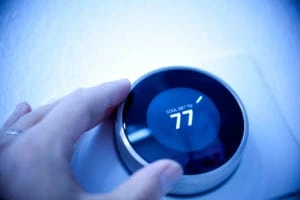How To Manage Humidity In Your House?
Nobody likes to deal with air that’s too dry or humid. Humidity levels are a great way to make a pleasant day uncomfortable, and an already-uncomfortable day worse. Humidity levels imbalance is much more than a comfort issue, though. There are health considerations that you should be aware of. It’s a good idea to know how to manage indoor humidity levels in your home, if you know that they tend to get unbalanced frequently. While the act of air conditioning from your HVAC system can naturally affect high humidity, excess moisture and mold growth and mildew can all stem from excess humidity problems and moisture levels. Whether you use a whole-house dehumidifier or exhaust fans, air conditioning or other methods, controlling the excess moisture or low moisture levels can be important for homeowners. Have a look at some of the best ways that you can manage humidity levels below.

High Humidity Issues
During the summer, high humidity levels tend to be more of a problem. The reason that humid days seem warmer is because of the amount of moisture that will buildup in the air, creating high humidity, which raises the evaporation temperature of liquid. That includes sweat, which takes a longer time to evaporate than it would on a dry day. The longer it takes your sweat to evaporate, the harder it is for your body to cool off. As we said earlier, though, high humidity is not simply a problem for comfort levels.
High humidity also promotes mold growth in the darker areas of the home, like under the sink and faucets, and in the walls, crawl spaces, or anywhere that has little or no air circulation or poor ventilation. Your home’s humidity level and moisture problems are something you should keep at the forefront of your mind, especially in areas with no airflow. While not all mold is harmful to humans, some varieties can cause serious health issues that require hospitalization. There are a number of ways that you can deal with high humidity. In hot weather, the easiest thing to do is just run your air conditioner. The air conditioner naturally dries out the air that moves through it during the cooling process. It isn’t a dedicated dehumidifier, so it will take a bit longer to accomplish the same thing. However, it does work in a pinch. The other option, of course, is to install a dedicated whole-home dehumidifier, which can remove moisture throughout the home.
Low Humidity Issues
Chronically dry air may be less immediately obnoxious than humid air, but low relative humidity still has issues. The main problem with dry air is that it dries out your skin and nostrils. This causes cracks which, aside from being painful, provide gaps in your body’s defenses for germs to infiltrate. Low humidity also saps the furniture and other word portions of your house of moisture, making them more brittle and easy to damage. If you want to prevent this from happening, the best thing to do is to install a whole house humidifier, which can give a way to control humidity inside your home.
Whole house humidifiers operate in a variety of different ways. You’re probably most familiar with misters, which just spray a fine mist of water droplets into the ducts while the climate control system is operating. There are also vaporizers, which create steam to accomplish more or less the same effect. If you’re not sure which kind of humidifier or dehumidifier to install in your home, it’s never a bad idea to consult with a professional technician. They’ll be able to recommend the best option for your needs.
Tips For Managing Humidity Levels In Your House
Using a hygrometer, you can measure the humidity levels in your home, so you know what you need to do to reach your ideal indoor humidity, beyond trying turn the thermostat up or down!
Whole-home dehumidifiers: These can help pull the excess moisture from your home.
Whole-House humidifiers: There can help replenish the low moisture content in your home.
Houseplants – some houseplants can absorb moisture (water vapor) from the air (just be sure to avoid plants that could have allergens or pollen that you or your family may be allergic to!)
Shorter showers – showering can create moisture problems, if you’re using very hot water and take long showers, causing moist air to fill the room.
Climate Control Heating And Cooling, Inc. Provides A Full Range Of Indoor Air Quality Services In Kansas City, MO. If You Need A Humidifier Or Dehumidifier Installed In Your Home, We Can Help. Contact Us Today To Schedule An Appointment With One Of Our Expert Technicians.




